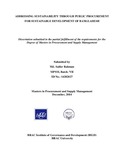Addressing sustainability through public procurement for sustainable development of Bangladesh

View/
Date
2014-12Publisher
BRAC UniversityAuthor
Rahman, Md. SaifurMetadata
Show full item recordAbstract
Purpose: Achieving sustainable development is one of the many challenges confronting Bangladesh in its attempt to attain the middle-income country status by 2021. Recognizing the important role that public procurement can play to support sustainable development, the study seek to provide an assessment of the scope and current practices of addressing sustainability imperatives in public procurement. Second, learn about perception of procurement practitioners with barriers and opportunities of using public procurement as a tool to foster sustainable development of Bangladesh.
Methodology: The study utilized a both qualitative and quantitative approach. A semi structured questionnaire was used to collect primary data from randomly selected 60 procurement practitioners in public sector. The recorded data were analyzed by using SPSS 17 version package.
Findings: The highest proportion of the procurement practitioners was middle aged and male. Majority of them were from engineering background with post graduate education and involved in the development of specification and tender document for their organisation. Almost all of them were trained in public procurement but most of them did not get training on sustainable and ethical procurement and sustainable development. The highest portion of them define SP as procurement based on considering the environmental, social and economic impacts for achieving long term value for money and had a good level of perception on each aspect of addressing sustainability through public procurement. Highest proportion of the respondents did not adopt life cycle costing, E-procurement process. Most of their practices did not encourage local domestic firms and SMEs, identifying and assessing environmental and social impacts before launching a high value tender, promoting sustainable building design, health and safety, legal provision of rest, vacation and wages of workers. Their organization had no EMS and policy for cost saving and avoidance of mis-procurement. They did not consider disposal issues of procured goods works and services. However, majority of the respondents considered adequate competition and suppler profit in their tender price. Their process follow the principle of equality and they did not buy goods/works and services where child labor is used. Although there is no specific guideline, various sustainability criteria could be incorporated through specifications, selection criteria and contract performance clauses within the existing framework of PPR. Despite the potential of using public procurement as a viable tool in the pursuit of sustainable development, there exists low level of awareness and understanding among the procurement practitioners. Improvement of environmental quality, higher labor standard and optimize use of natural resources were regarded as highly ranked opportunity arise from addressing sustainability through public procurement. Lack of policy guideline, absence of political will in promoting sustainability and avoidance of complexity for secondary objective of procurement were the common responses as barrier. In addition to formulate a sustainable procurement policy, political willingness and a clear commitment is necessary form the government.
Research limitations: Besides limited only to public sector, the study highlights the importance of supporting factors, like transparency, accountability, preventing corruption as well as leeway in public policy, for using procurement as a tool for sustainable development.
Policy implication: Given the increased attention of achieving sustainable development in Bangladesh, the study seeks to develop an emerging thought among policy makers and academic researchers to use procurement as one crucial tool for sustainable development. The proposed typology of sustainable procurement for the public sector can serve as a basis for future research in this area.
